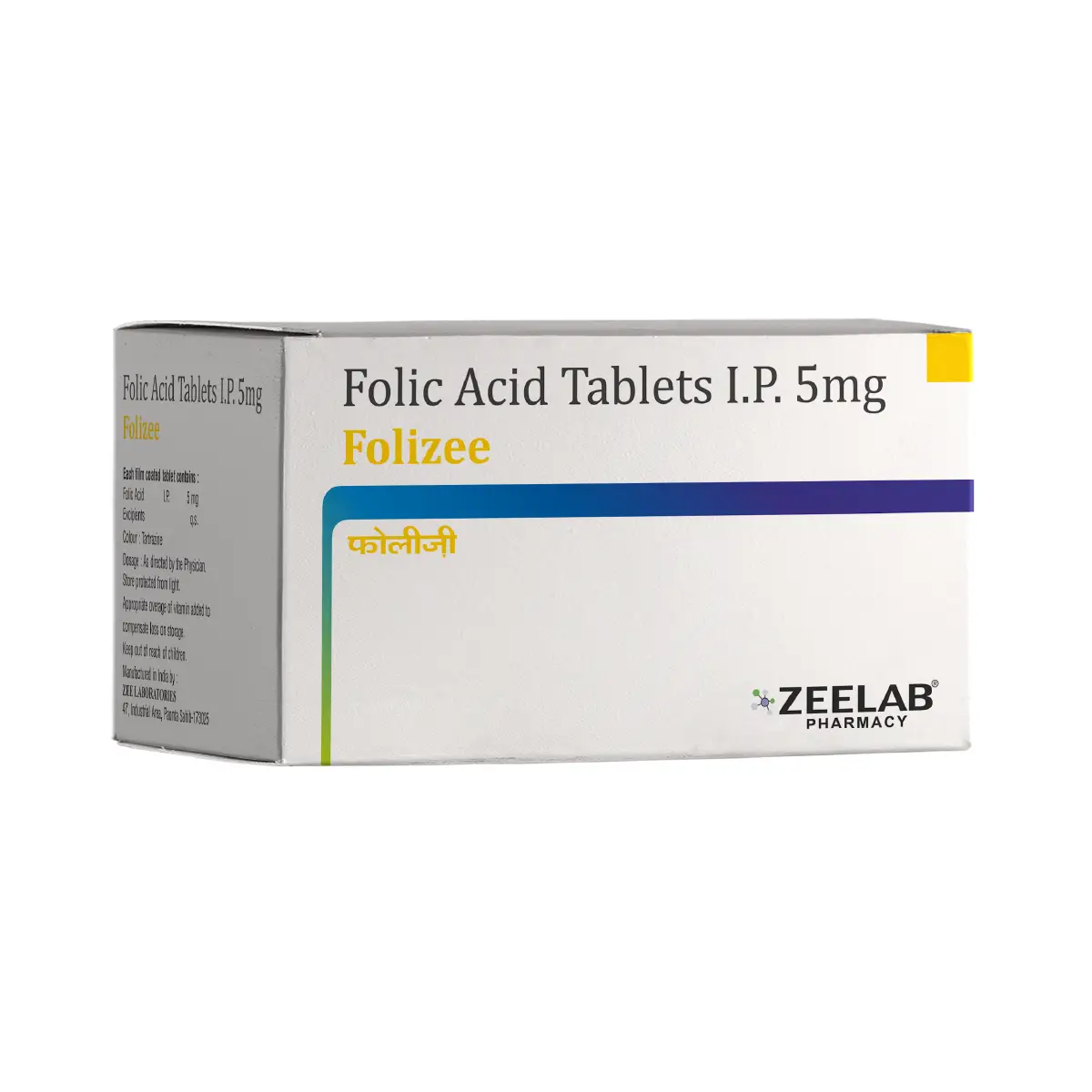Folic Acid
Introduction
Folic Acid is a type of B-vitamin that plays an essential role in the formation of red blood cells and in the synthesis of DNA. It is crucial for proper cell division and is particularly important during periods of rapid growth, such as pregnancy and infancy. It helps prevent birth defects and is widely recommended as a supplement for women planning pregnancy or during early stages of pregnancy. Folic acid is also vital for overall health, including supporting cardiovascular and immune systems.
Available Medicine for Folic Acid
Uses of Folic Acid
- Used to treat folate (Vitamin B9) deficiency
- Helps in preventing and treating megaloblastic anemia
- Commonly prescribed during pregnancy for fetal growth and development
- Helps prevent neural tube defects in developing baby
- Supports red blood cell formation and improves hemoglobin levels
- Used in patients with poor diet, malnutrition, or absorption problems
- May be given with certain medicines (like methotrexate) to reduce deficiency risk
How Folic Acid works
Folic Acid works by increasing folate levels in the body. Folate is needed to make DNA and new cells, especially red blood cells. When the body does not have enough folate, red blood cells become large and unhealthy, leading to anemia and weakness. Folic Acid helps in producing normal red blood cells and supports proper cell growth. It is also very important during pregnancy because the baby’s brain and spinal cord develop rapidly and need adequate folate for healthy formation.
Benefits of Folic Acid
- Helps prevent folate deficiency and related health problems
- Improves red blood cell production and supports healthy hemoglobin
- Reduces weakness, tiredness, and dizziness caused by anemia
- Supports healthy pregnancy and baby’s growth
- Lowers the risk of neural tube defects in unborn baby
- Promotes healthy cell division and tissue formation
- Useful in nutritional deficiency and recovery support
How to take Folic Acid
Take Folic Acid exactly as advised by your doctor. It is usually taken once daily, with or without food. Swallow the tablet with water at the same time each day for best results. Do not skip doses, and do not take extra tablets without medical advice. The dose may vary depending on your age, health condition, pregnancy status, and folate levels. If you miss a dose, take it when you remember. If it is almost time for the next dose, skip the missed dose and continue your schedule.
Type of Dosage Available
- Tablet
- Capsule
- Syrup / Oral solution
- Injection (in hospitals/clinics as prescribed)
Side effects of Folic Acid
- Nausea
- Stomach upset
- Loss of appetite
- Bloating or gas
- Bad taste in mouth
- Skin rash (rare)
- Allergic reaction like itching/swelling (very rare)
- Breathing difficulty (very rare but serious)
Safety advice
- Pregnancy: Safe and commonly recommended during pregnancy. Take as per doctor’s advice.
- Breastfeeding: Generally safe in recommended doses. Consult doctor for correct dosage.
- Allergy: Do not use if you are allergic to Folic Acid or any ingredient in the medicine.
- Vitamin B12 deficiency: Inform your doctor if you have Vitamin B12 deficiency, as folic acid may hide symptoms.
- Kidney/Liver disorders: Use with caution in severe conditions and only under medical supervision.
- Drug interactions: Tell your doctor about all medicines you take, especially anti-epileptic medicines and methotrexate.
- Do not overdose: Always follow prescribed dose for safe results.
Frequently Asked Questions (FAQs)
Q. What is Folic Acid used for?
A. Folic Acid is mainly used to treat folate deficiency, anemia, and to support healthy pregnancy by preventing birth defects.
Q. Can I take Folic Acid daily?
A. Yes, Folic Acid can be taken daily if prescribed. It is especially beneficial during pregnancy and in folate deficiency.
Q. Is Folic Acid good for pregnancy?
A. Yes, it is one of the most important supplements during pregnancy. It supports baby’s brain and spinal cord development and reduces risk of neural tube defects.
Q. Does Folic Acid increase hemoglobin?
A. Yes, it supports healthy red blood cell formation and improves hemoglobin levels, especially in folate deficiency anemia.
Q. What are the common side effects of Folic Acid?
A. Common side effects include nausea, stomach upset, gas, bloating, and loss of appetite. Serious side effects are rare.
Q. Can men take Folic Acid?
A. Yes, men can also take Folic Acid if they have folate deficiency or anemia, as prescribed by a doctor.
Q. When should I take Folic Acid, morning or night?
A. You can take it at any time, but it is best to take it at the same time daily. Many people prefer morning after breakfast.
Q. Where can I buy Folic Acid at the best price?
A. You can buy Folic Acid from Zeelab Pharmacy at the best price with trusted quality and reliable service.
Related Salt
Folic Acid (5mg)
Disclaimer : Zeelab Pharmacy provides health information for knowledge only. Do not self-medicate. Always consult a qualified doctor before starting, stopping, or changing any medicine or treatment.
Download India's most affordable pharmacy app
- Compare with medicine prices
- Save upto 90% on your medicine bills

Temperature Controlled storage and delivery

Regular Sanitization

Disinfected Packaging

Temperature Checks
No Contact Delivery
Easy Return on Issues
60M+
Visitors4L+
Customers7L+
Orders Delivered1800+
Cities60M+
Visitors7L+
Order Delivered4L+
Customers1800+
CitiesNeed Medicines Quick?
Share location to check quick delivery serviceability.
Change Location
Location Access Needed
Your location appears to be blocked or disabled.
Please enable the location from your browser or
device settings.

₹ 0
0
Items added
Quick Links
Categories
Our Policies
2026 Copyright By © Zeelab Pharmacy Private Limited. All Rights Reserved
Our Payment Partners

 Added!
Added!
|
|










